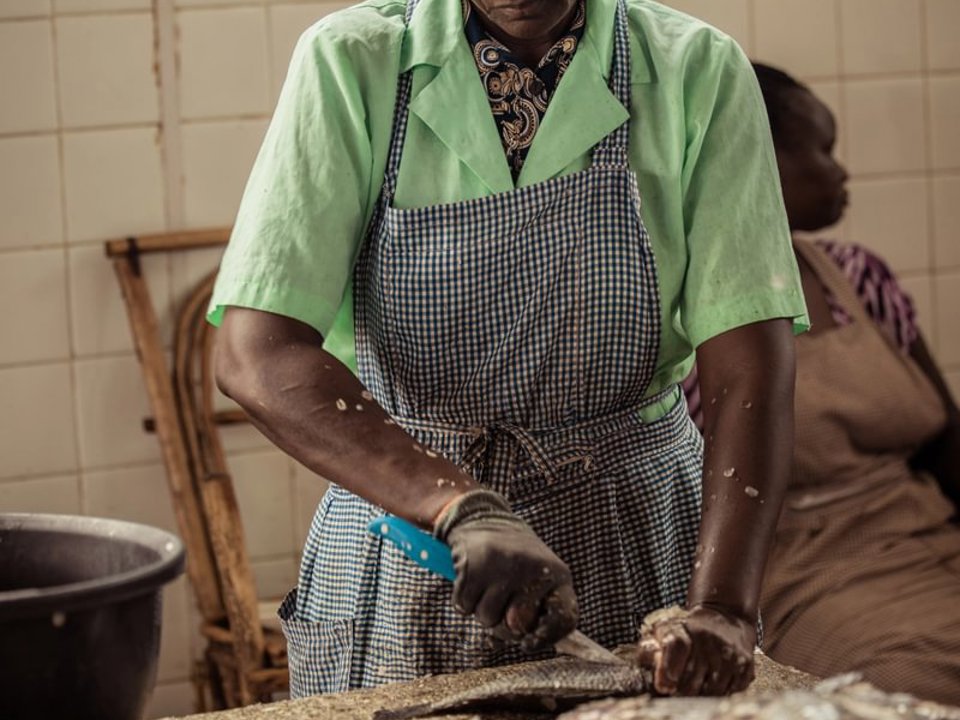Ripples of hope – fishmonger women
Lake Victoria, Kenya
These women process fish, which puts them in the middle of a value chain. It also puts them at risk of significant harm. And when they can’t work, they have no income. So, we’re supporting Commonwealth Business Women Africa to make positive changes to these women’s working lives. This includes implementing safety measures in the workplace and introducing alternative ways to earn an income.

Why this project
The fishmonger women work long hours – but reap little reward.
They buy fish from men, process it, and then sell it on to end consumers via male agents.
Handling the fish can cause them significant harm, such as sickness from fish spike injuries to hands and feet, fish waste and smoke inhalation. Some also have eyesight problems because the scales can get into their eyes. And they don’t have money for healthcare.
It’s not just the women who are at risk, as they also need to bring their children to the workplace. The jikos (portable stoves) are open, and the children are at risk of falling into the fire or hot oil.
When the women can't work, they end up in a downward spiral. They are sexually exploited by fishermen and agents – the only way they can repay their debts. As a result, many women are HIV positive.
Project goals
These are based on the risk assessment recommendations for a safer and healthier working life for the fishmongers and include both short- and long-term targets. You can download the risk assessment at the bottom of this page.
Provide workers with the tools and facilities to conduct their work in a safe and healthy way.
Support the workers and community to make the transition from informal to formal economy.
Educate and train the workers on the hazards and risks of their working practices and explain how these can be avoided.
Educate and train the women on new opportunities for work and how to utilise their current work to produce alternate products for additional marketing and income.
Raise awareness and gain support from partners, governments and interested parties to help the workers change their current way of working through investment, training and provision of safety supplies.
“There’s a lady who was carrying her oil from the fire and she fell down with the oil. She got burnt: her face, her body. She’s still recovering. It’s been almost four months.”
Catherine Odongo
- Job role
- Fishmonger, frying unit
Who is involved
- Commonwealth Business Women Africa (CBW-Africa)
- Commonwealth Enterprise and Investment Council (CWEIC)
- Directorate of Occupational Safety and Health Services, Kenya
- Equity Bank
- Fishmonger women and quarry scavengers
- Government of Kenya
- IOSH consultants
- Local IOSH members
- Local sewing machine trainers and fish flies trainers
- Workplace Safety Professionals Association of Kenya
Progress so far
- Local occupational safety and health experts and IOSH members conducted an impartial risk assessment to assess the current conditions (November).
- A well-wisher gave each woman $100 USD to inject into their business (January).
- Identified Kenya Industrial Research and Development Institute (KIRDI) as a partner to train the women in two areas: fish leather production and pig feed manufacture (March).
- CBW-A started a partnership discussion with Kenya Commercial Bank to provide financing to the fishmonger women (April).
- The women have transitioned to the formal economy and formed co-operatives. This means they are better protected (September).
- The women will be trained how to safely continue with their existing fish processing and produce fish leather and pig food as by-products. This will increase productivity and their ability to sell these products at market value (May-June).

Get involved
We welcome your support in helping people stay safe at work. It can change the lives of the most vulnerable workers. Find out more about these projects and the work we are doing.
 IOSH
IOSH